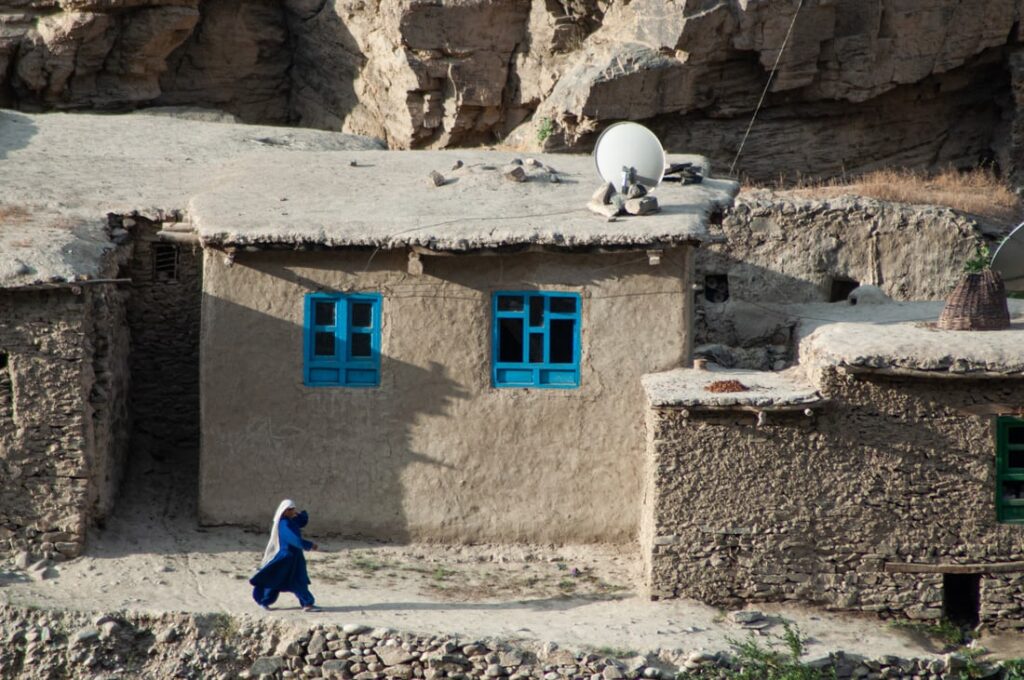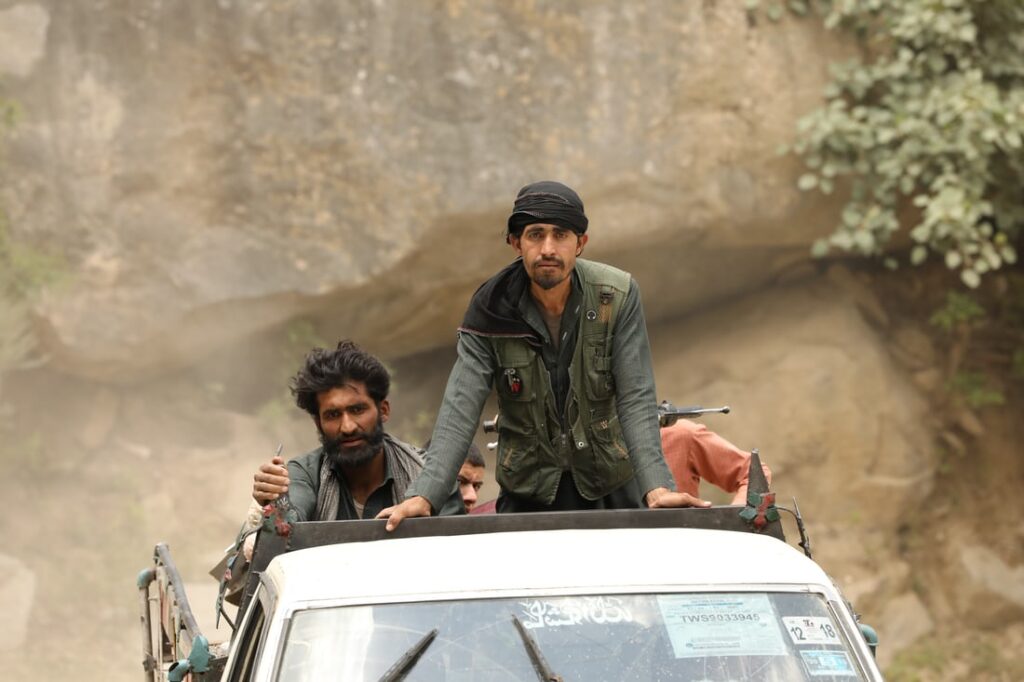
I am free again. I float above these grand mountains, looking down from the azure sky at the starkness of my homeland, which has a strange beauty all its own. It is not unlike the ravaged faces of its women, maintaining vestiges of dignity despite it being robbed from them time and time again, in a man`s world, filled with nothing but darkness for the weak and their ilk.
Now that I am mere spirit, I can go where I choose without fear or forfeiture. I can listen to thoughts before they translate into action, I can read the minds of men, I can cast my inhibitions to the strong mountain winds blowing down from the Hindukush and dance uninhibitedly with the poppies swaying in the breeze, sing with the babbling brooks till my throat is hoarse and gambol through the mountains with the grace of the ibex and the markhor. I have now however, left my earthly form behind. I have stood on the grassy knoll, behind the small knot of mourners watching my earthly remains being consigned to the beloved soil of my country, for dust we are and unto dust we shall return. But without my lost form, I can no longer act. I can only watch, unhindered. I can no longer save lives….
I am Reha, in Dari, my mother-tongue, Freedom in the strange language of the Westerners, and Swatantra in the language of the Hindus who live to the far East of us. I spent my last memorable days having fled to what I was deluded into thinking was the safety of my hamlet, before the invading armies of my own people, baying for blood thanks to the deep rift and mistrust which divided my homeland in a way the tall mountains and deep valleys never could. A land as harsh as it is beautiful, as cruel as it is kind, its humane face perhaps surviving only in unforgettable short stories like Tagore`s “Kabuliwallah”.
I remember the distant days of my childhood, lost in the hoary past, in the tiny hamlet of Falak. Situated in the lee of the tall peaks of the Hindukush range, it was a place bordered by clear streams and pebbles. A cluster of tiny huts, clinging to the mountainside, struggling to eke out a meagre existence in an unyielding land. Days came as suddenly with the sun as the nights with a cloak of darkness. The stars twinkled and winked overhead and the wind, it blew and blew and blew, never pausing like the unending whirls of a dervish dance. You could walk lonely miles with none but your horse and thoughts for company. We lived alone, safe in our cocoon of isolation. I was a privileged child, because for my parents it mattered not that I was a girl. My mother was part Tajik and taught me skills which she had learned in her motherland, the healing powers of the herbs which grew in this wild land, navigating by reading the stars and riding bareback along the steepest trails. My mother was also a skilled midwife and I like to think that the Almighty saw to it that I inherited her skill. I often travelled with her to distant villages on her errands of mercy and I still marvel at the tall strapping men whom I had known as mewling babies.
Yes, life in the wilds of Badakhshan was difficult without doubt, but it rewarded one with the beauty of uncomplicated simplicity. We were born, grew, worked, lived, laughed, aged and died in the same way as hundreds, perhaps thousands of our ancestors. It was as close to divinity as we could get.
And then, THEY came. Unexpectedly, insidiously, a mere trickle, in twos and threes, which suddenly grew into a flash flood in the blink of an eye, until the country was torn with strife and life as we knew it changed forever. In our harsh land, there was no room for the softness and beauty that was the privilege of women elsewhere in the world, but we had our freedom, to mingle with our kind, to explore our domain unfettered, in fact we Hazara were not nomads but farmers, musicians, educationists, even soldiers in far-away Kabul. We were the Persian remnants in this land and we were the Ismaili Shia.
Anything at the crossroads is always being torn asunder and my country, at the cross-roads of the ancient fabled Silk-Route a diaspora of different tribes was no exception, whether it was two imperial western powers trying to hold sway or the infighting amongst us which made us fair game. Hordes swept from north to south, reversed direction and set off again. These power-hungry, hatemongers had not a care for us, the common people who paid the ultimate price in this game of thrones.
The turning of the millennium had brought some respite from those who posed as ‘The Students’. Charged with aiding and abetting a major terrorist attack which succeeded in smiting the beating heart of the West, they were unceremoniously ousted from power inadvertently having bitten the hand which fed them. Their fall from grace coincided with my birth and my parents taking it as a sign that I was born into a freer world, decided to call me Reha, the one who is born free and who would lead them to happier times. Societal changes started creeping in insidiously, much like the winter snows melting on the mountain tops and we seemed to be headed to that mystical moment in time when our country was our own, progressive, free and keen on joining the new world order.

On dark winter nights, you could hear plaintive laments about those gloomy times, about lost lives and loves and on bright summer days, the scars on the land and on the people burned red like accusing fingers pointing at a world which had failed them. My mother bore the mark of twenty lashes, which had been her lot when she had ventured out on her midwifery duties without her guardian. When I first realized what they were, I had cried for two days at the thought of my gentle mother being subjected to this inhuman cruelty just by the virtue of her gender. No God could be so cruel, I thought, not my God who was the all merciful.
And so, the years passed with the shadows gradually waning until I was sent to Kunduz, the nearest town to train as an auxiliary health care worker. The day of return was nearing when like a hundred-headed hydra, THEY returned too. Of course, the news of friends-turning-foes-turning-friends, which the Westerners excelled at, leaving the country for good had been rife for the past year, but the avalanche which swamped us was totally unprecedented. The last time the insurgents had been unable to breach the strong-hold of the Badakhshan, but this time, they were better prepared. The capitulation was easy and complete, making me wonder about all those who had been complicit in what was touted as bloodless coup. For wherever The Students went, a trail of blood followed, the blood of the weak and the downtrodden, of the poor and the helpless and of women and children, who were mere chattel to these men of strong arms.
A few days after their return, my parents decided that I would be safest in my village, instead of battling everyday life in a larger town, which was more fraught with danger. And thus, I returned, having left my training incomplete, little realizing that the old way of life was gone, replaced by one of bondage which would ultimately succeed in snuffing out my life, much sooner than expected.
No sooner did I return, than I was expected to accompany my father to the local place of worship and meet the one who led the call to prayer. This was my first encounter with the dreaded lists which were being prepared throughout the land, the freedom of a woman in exchange for the lives of men. For THEY had promised that if THEY could have two lists, one of girls aged from twelve to eighteen and another of women from nineteen to forty so that they could be divided up as the spoils of war, no able- bodied men in the villages would be killed ruthlessly, hung from bridges and trees if the gruesome tales from nearby Galbagh were to be believed. In the era of the smartphone, videos of such heinous acts had already begun making the rounds, bringing home the cold, callous cruelty of The Students like never before. The screams of twelve-year old Afhak, the first casualty of our village as she was dragged away for the tiny transgression of pulling up the face cover of her veil as she negotiated the steep path on her way home have followed me into the hereafter and still resound in my ears. How could the rest of our village feign deafness? Did one not die a thousand deaths upon giving in meekly to such barbarism? Would life ever be the same again knowing that the dead would remember our indifference and silence? But, fear for life it sadly seemed was all consuming. Everything was normalized under the shadow of weapons.
Those two lists were the harbingers of doom. Escape was no longer possible, every familiar place having been overrun, abounding with their own tales of horror. There was nowhere to run, nowhere to hide. My mother being the midwife for quite a few villages had been keeping records of all the infants she had helped deliver and these helped ascertain the age of children in this wilderness where numbers and counting were discounted for. With people trying to hide the true age of their daughters, her records became invaluable. She had been surreptitiously destroying them for a long time, but the task was long and arduous as they were regularly submitted to the headman and she could not pilfer them without arousing suspicion, especially now that they had gained tremendously in importance.
On that fateful day, she managed to get her hands on almost all of what she called her ‘record’, but the gradual mysterious disappearance of these papers had not gone unnoticed. The betrayers were many and in a heartbeat, The Students stood on the threshold of our modest home, keen as bloodhounds on the scent. My mother stood her ground, refusing to hand over her lists in a last stand to protect those innocents whom she had once helped bring into the world. She knew well the price she would have to pay, lashes, stoning or worse. But, God was merciful. Without much ado, the leader of The Students killed her with a single shot, fired point-blank to her head.
As I watched from the doorway, I saw the gun turn towards me in slow motion. As I slumped over when the bullets found me, The Students found that my hands which I had held behind my back had been committing some papers to the fire in the fireplace behind me, which had now curled into black scraps, the smoke from them drifting upwards together with my spirit as it left my body.
Those scraps perhaps gave some girl-children a few more days of freedom. They were all that was left of my mother`s list, the third list…..

7 replies on “The Third List”
Poignant! Couldn’t help but cry.. I promise never to be indifferent, never to be silent.
Enjoyed reading the picturesque naration and descriptive treat to the core.Felt delighted and am proud to acknowledge you as a precious jewel in my Crown as a Teacher darling.Kudos to you!
Very beautiful overall great imagination of author .
Really well described ,one can only imagine the pain and suffering of those who have experienced this.
🙌
So very well written …..more power to the woman tribe💪💪💪💪🙏🙏🙏👍
Wonderfully written!
Wow Sumedha you are so talented and you have managed to capture the struggles of life of these poor girls so well. Kudos to you!